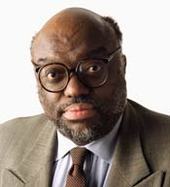Caught up with Stanley Crouch, Daily News commentator extraordinaire, author, and jazz maven who participates in a talk and performance Thursday night at Lincoln Center called, with affection,"Blacks, Jews, and Jazz." It's a busy week for enlightening ideas. That same night, award-winning filmmaker Alexandra Pelosi's latest documentary premieres on HBO. A liberal from San Francisco (and Nancy Pelosi's daughter so there'll be a mom question in that Third Screener), she has spent years getting to know and like and care about the Conservative Right on their campaign trails, in their homes, in their churches, and in their heads. She spoke with me about Americans she has met on the far right who are devastated by the loss of John McCain, believe other pieces of their dream are shattered, and why it matters to liberals, and matters a lot. Take a look at her Third Screen, too.
What I heard from Crouch and Pelosi, each in their own way, is this: Rectitude good; inflexibility bad. Complexity good; obfuscation bad. Sophistication good; elitism bad. Inclusion good; exclusion ... tempting but get over it. Are we ready to become one big country about the thickness, not the color, of our skins, and the content, not the footnotes, of our character? Here's what Crouch knows ...
Third Screen: Tell me about "Blacks, Jews, and Jazz" at Lincoln Center.
Stanley Crouch: I wasn't really involved in the planning of it but it's a subject that perennially arises in jazz because of the very close relationship, esthetically and financially, between black people and Jewish people. You've had many Jewish players -- Benny Goodman stands out. The first thing to know is the principle that Benny Goodman represented when he brought an integrated band to Carnegie Hall in 1938. It was actually an enormous financial risk and he was advised not to do it. You've had many Jewish entrepreneurs -- George Wein, who created the "Newport Jazz Festival" and Norman "Mel" Granz, who had a very successful touring package called "Jazz at the Philharmonic" which began to break down certain barriers. Granz wouldn't bring it to cities where his black performers couldn't stay in the same hotel as his white performers.
Third Screen: How do we talk about this without stereotyping?
Stanley Crouch: To those who stereotypically believe that all Jews have a far superior understanding of money, I say the best argument against it is to look at Spielberg and all those others Madoff just took for a ride. I don't think stereotypes can be avoided. There's nothing you can do about people who are going to think that way. If someone's going to be sexist, racist, or anti-Semitic, they don't need you to help them. But there's the thing -- if Norman Granz' had only been interested in making money and exploitation of his musicians, he would have gone along with segregation.
Third Screen: So what was the central quality of the relationship?
Stanley Crouch: Jazz anticipated the Civil Rights Movement because musicians on their own discovered the fundamental issue -- respect for the individual. Everybody gets a shot -- to be good, to be mediocre, to be bad. Through the music, musicians simply started getting together. They didn't care. It's very important that Jack Teagarden and Benny Goodman chose to go into black neighborhoods and play with people. They were told whatever they were told at the time, but they set aside everything other than that they liked music. They encountered people they liked, people they didn't like. They encountered people. And whatever black musicians had about white musicians was broken down by Goodman. Teagarden was a German-American Jew. I haven't met any black musicians who say that Jack Teagarden could not play. He could play. They used to like to say that he must be part Indian. They'd say "that Indian can play." The basic thing on every level, whatever stereotypes existed then or now, is that it's rooted somewhere in human reality, but painted with broad strokes. I remember a Jewish friend of mine saying many years ago, well, I was talking to him about whether most Jews are smarter than everybody, and he said "We have smart ones, but the dumb ones are multitudinous." I think that all true exchanges between coalitions, between Jewish Americans and Black Americans and in every variation that you can see in human relationships, you see in jazz. You see great friendships, deep loyalty, good business, bad business, you see everything. You don't see one relationship.
Third Screen: Jazz represents the country?
Stanley Crouch: Yes. I really think it does. And I think Obama brings such a sophisticated way of dealing with this reality of the world. The very fact that he never denied his ethnicity but never ran as an ethnic candidate, that he ran as an individual seeking the highest office in the land, and the way he's organized his cabinet and will hopefully address many problems in society, this will make it easier for people to call things the way they see them, as they do in jazz.